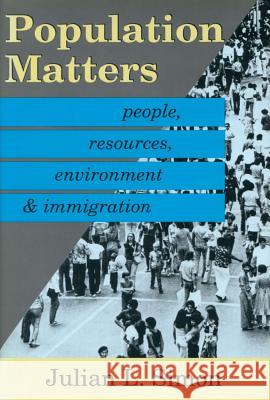Population Matters: People, Resources, Environment and Immigration » książka
Population Matters: People, Resources, Environment and Immigration
ISBN-13: 9780887383007 / Angielski / Twarda / 1990 / 577 str.
Since 1970, Julian Simon has been challenging the doomsayers and their conventional beliefs in a series of controversial popular essays based upon his technical scholarly research. These have been his central message: Raw materials and energy are getting less scarce. The world's food supply is improving. Pollution in the United States has been decreasing. Population growth has long-term benefits, even though added people are a burden in the short run. The United States needs more immigrants.These essays are the core of Population Matters. The central vision is of human being who, on balance, create more than they destroy, if they have adequate incentive to create and guarantee protection of the fruits of their labors. The debate on these questions concerns the effect of the number of people on the standard of living. Simon sees the following mechanism at work: Population growth and increased income expand demand, and prices of natural resources are forced up, triggering the search for new supplies. Eventually new sources and substitutes are found, and humanity is better off. How quickly this happens is critical; and here the presence of economic liberty and respect for property are of central importance.There is no doubt that Julian Simon has influenced the professional consensus on these questions. But he does not preach complacency, nor does he think that new resources and economic advances are inevitable. He reminds us that institutions that protect property and reward initiative must be protected. Above all, we must remember that the ultimate resource is people, whose exercise of will and imagination for their own benefit inevitably benefits us all. Those who have read and enjoyed Simon's other books or his writings in the popular media will find this a spirited examination of the compelling issues of our day. Some of the most provocative essays in the volume have never before been published. Social and physical scientists may be stimulated to rethink some of their assumptions, and the general reader will be engaged by the force and style of his arguments.











